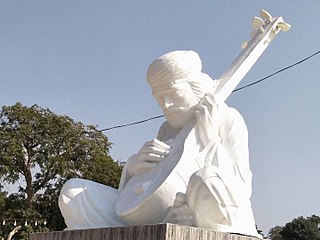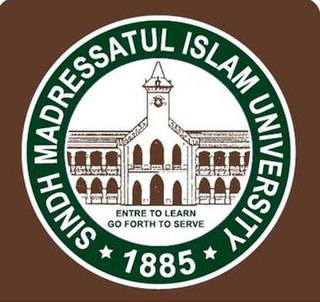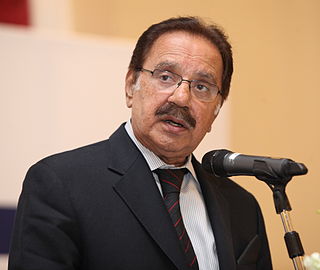
Shah Abdul Latif Bhittai,commonly known by the honorifics Lakhino Latif,Latif Ghot,Bhittai,and Bhit Jo Shah,was a Sindhi Sufi mystic and poet from Pakistan,widely considered to be the greatest poet of the Sindhi language.

Sindh Madressatul Islam University is a university in Karachi,Sindh,Pakistan. Founded in 1885,it is one of the oldest educational institutions in South Asia.
Sindhi literature is the collection of oral and written literature in the Sindhi language in prose and poetry. The Sindhi language of the province of Sindh in Pakistan is considered one of the oldest languages of ancient India,and influenced the language of Indus Valley inhabitants. Sindhi literature has developed over a thousand years.
Makhdoom is an Arabic word meaning "Teacher of Sunnah." It is a title for Pirs,and landlords in South and Central Asia.

Makhdoom Muhammad Ameen Faheem was a Pakistani populist left-wing figure and a poet. He was the senior vice-chairman of Pakistan Peoples Party,chairman of Pakistan People's Party Parliamentarians and former chairman of Alliance for Restoration of Democracy.
Nabi Bakhsh Khan Baloch was a Sindhi research scholar,historian,sindhologist,educationist,linguist and writer. He predominantly wrote in Sindhi,but also in Urdu,English,Persian and Arabic. He has been described as the "moving library" of the Pakistani province of Sindh.
Sindhi Adabi Board is a government sponsored institution in Pakistan for the promotion of Sindhi literature. It was established in 1955 in Jamshoro,Sindh. It is under the Education Department of the Government of Sindh.
Makhdoom Muhammad Zaman Talibul Moula was a Pakistani politician,scholar and poet. He was the 17th Sajjadah Nasheen of Ghous-ul-Haq Makhdoom Sarwar Nooh Shrine best known "Sarwari Jammat" in Hala. He was born on October 4,1919,in New Hala. He is the father of Makhdoom Muhammad Amin Fahim and Makhdoom Saeeduz Zaman.

Ranipur is a town in northern Sindh province of Pakistan,located in approximately 50 kilometers from the city of Khairpur,and approximately 30 kilometers from the ancient Kot Diji fort. Ranipur is notable for being home of the famous Sachal Sarmast shrine,which displays fine examples of a traditional Sindhi tilework.
Muḥammad Hāshim Thattvī was an Islamic scholar,author,philanthropist,and a spiritual leader who was considered a saint by his followers. He was the first ever translator of the Quran in Sindhi language.
Mirpur Bathoro Tehsil is an administrative subdivision (tehsil) of Sujawal District. Previously it was in Thatta District in the Sindh province of Pakistan. Its capital is the city of Thatta.

Muhammad Idrees Dahri is an Islamic scholar,preacher,writer,author,poet and researcher of Sindh,Pakistan. He is Hanafi,Maturidi,and belongs to the Naqshbandi Mujaddidi Sufi order and the Barelvi movement of Sunni Islam. He is a khalifa (deputy) of Allah Bakhsh Abbasi Naqshbandi. He also has teaching permissions in Shadhili and Alawi Sufi orders.

Khawaja Muhammad Zaman of Luari was a sufi saint and poet from Sindh. His father,Shaikh Abdul Latif Siddiqi,was a descendant of first Rashidun Caliph Abu Bakr. Their forefathers had moved to Sindh in Abbasid era.

Ustad Manzoor Ali Khan was a Pakistani singer belonging to the Gwalior gharana singing style,one of the oldest singing traditions in Hindustani classical music. Born in Shikarpur,Sindh,Pakistan,he was the first classical musician of the twentieth century who knew about the regional music of Sindh.
Shaikh Abdul Majeed Sindhi was a famous Sindhi writer,politician and journalist of Sindh.
Dhol Faqeer son of Faqeer Muhammad Khaskheli,was born in 1921 at Patayoon,Mirpur Khas District. He was a famous mystic &folk singer of Sindh,Pakistan. He died on 22 June 1992.
Makhdoom Jamiluzaman is a Pakistani politician from Hala,Hyderabad District,Sindh,belonging to the Pakistan Peoples Party Parliamentarians. He was a member of the National Assembly of Pakistan. He became the spiritual leader of Sarwari Jamaat after the death of his father,Makhdoom Muhammad Amin Fahim,and was appointed the 19th caretaker of the Dargah Ghous ul Haq Hazrat Makhdoom Sarwar Nooh A.r.
Muhammad Faquir Khatian was a classical Sufi poet of Sindh,Pakistan. He was one the best Sindhi and Seraiki Sufi poets of Sindh during the British Raj in India.






